Update 2: In a stunning move, Argentina's MERVAL stock index was cut in half today, crashing 48% in USD terms on the day.
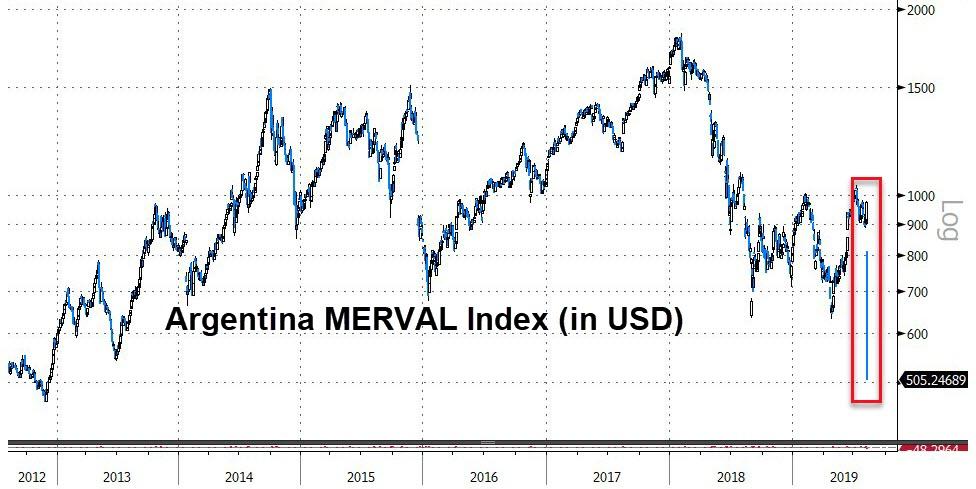
Source: Bloomberg
As Bloomberg reports, this is the second-biggest one-day rout on any of the 94 stock exchanges tracked by Bloomberg going back to 1950.
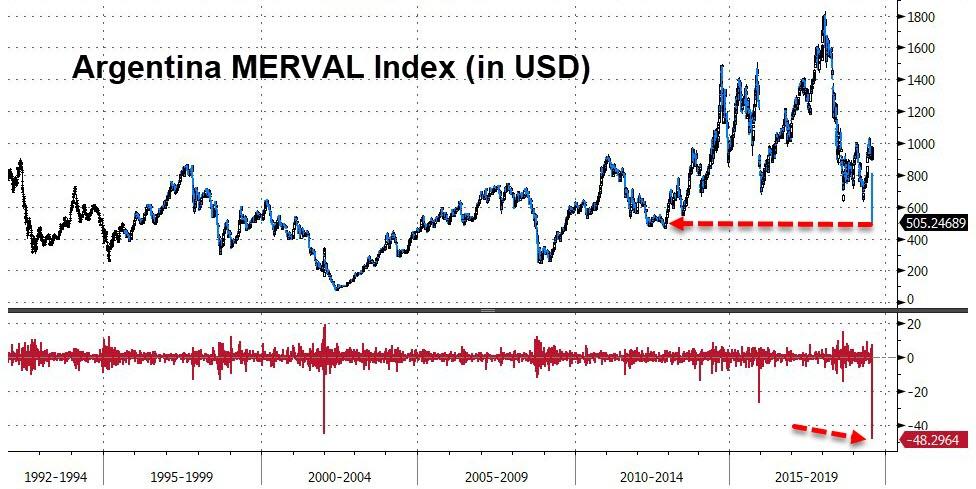
Source: Bloomberg
"The market is starting to price in default," said Edwin Gutierrez, the London-based head of emerging-market sovereign debt at Aberdeen Asset Management.
"The market is unwilling to give Fernandez the benefit of the doubt."
* * *
Update 1: With Argentina's capital markets sliding into the abyss on what we have dubbed Macri Massacre Monday, on the day the country's President unexpectedly lost a primary vote by a landslide unleashing political chaos and uncertainty, Goldman has effectively thrown in the towel and tells clients that "going forward investors may want to center their attention on any hints about the broad contours of the economic agenda of a probable Fernandez-Kirchner administration."
In other words, brace for the second coming of CFK, something markets are already doing with Argentina CDS exploding higher, and now reflecting a 72% probability of default in 5 years, up nearly 50% from 49% as of Friday.
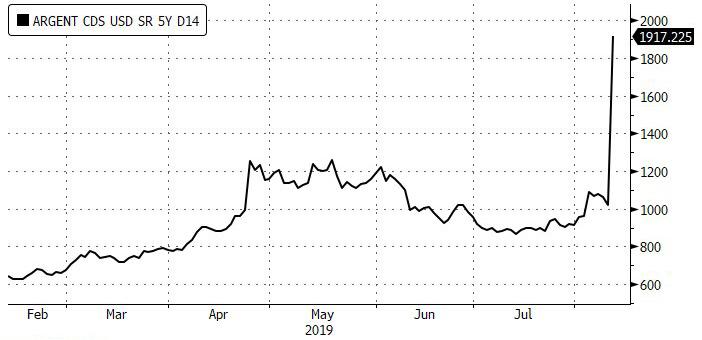
And with the CDS market having spoken, everyone else is following with Argentina equities imploding, as the Merval sinks 12%, its worst one day slide since 2008.
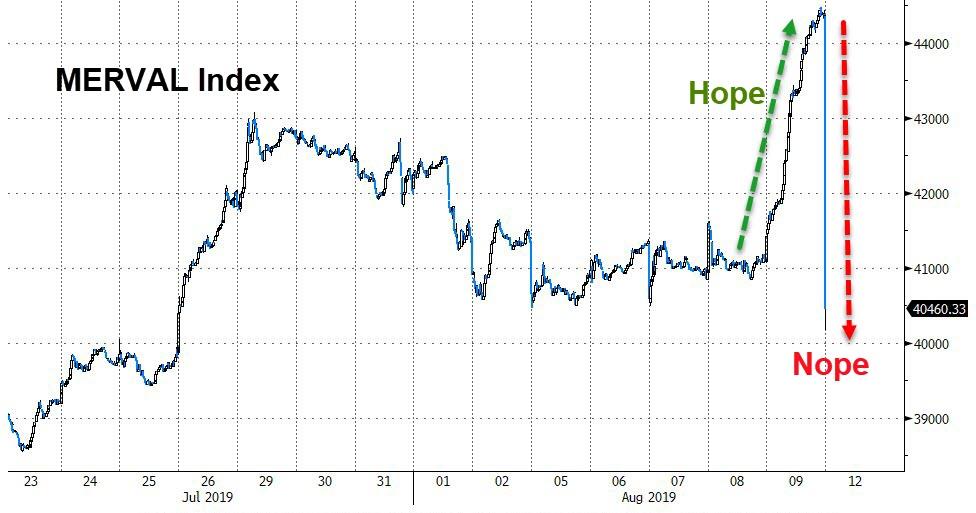
One wonders when fund investors - such as Templeton's Michael Hasenstab who may be on Epstein-watch this morning - will preemptively confiscate Argentina's ships ahead of the coming default, and CFK 2.0 return.
For all those curious, here is Goldman's hot take on what a bang up job the IMF did in Argentina:
A Much Worse than Expected Defeat for the Ruling Coalition in the Primaries
The main opposition candidate Alberto Fernandez (Frente de Todos) won the presidential primary elections (PASO) by a landslide on Sunday. Mr. Fernandez, whose ticket included former president Cristina Kirchner as running mate, won almost 48% of the votes, well ahead of incumbent president Mauricio Macri (Juntos por El Cambio) with 32% of the votes. The nearly 16 percentage point gap was much larger than what could be inferred from virtually all polls, which pointed to a tight race between the top two contenders.
Mr. Fernandez's strong performance in the primaries already leaves him well positioned to win the elections in the first round on October 27, without the need for a run-off. Argentine constitutional rules determine that a front runner presidential candidate who obtains more than 45% of the valid votes or who obtains more than 40% of the valid votes together with a 10 point-lead over of the runner-up will be automatically elected. Importantly, these thresholds exclude blank votes, which could slightly boost Mr. Fernandez's final tally relative to the PASO.
In addition to the surprisingly large deficit relative to the front runner, other elements reinforce the extent of Mr. Macri's setback on Sunday. First, the primaries recorded a reasonably high participation rate (approximately 76% of the 33.8 million registered voters; broadly in line with the 2015 PASO). Second, the primaries were largely dominated by the Frente de Todos and Juntos por El Cambio coalitions as expected; centrist candidates like former Minister Lavagna (Consenso Federal) lagged far behind the top two contenders. Hence, the "reservoir" of potential new voters available to Mr. Macri ahead of the first-round elections may be reasonably limited. To turn things around, the incumbent will likely need to swing a large number of votes away from the opposition, which seems improbable in this highly divisive political backdrop.
The primaries for the governorship of the province of Buenos Aires – home to nearly 40% of the national electorate – proved to be another resounding defeat for the Juntos por El Cambio block. Incumbent Governor Maria Eugenia Vidal obtained less than 33% of the votes, trailing former Minister Axel Kicillof (Frente de Todos) by a nearly insurmountable 17 percentage points. Such a large shortfall is revealing as Ms. Vidal is one of the most popular leaders within the ruling coalition, having been touted by some insiders as a more competitive option for the presidential race compared to Mr. Macri.
By all odds, domestic and international investors will be disappointed with the results of the PASO. The probable deterioration of sentiment and the resulting tightening of financial conditions in coming days and weeks may pose yet another headwind to the still fragile recovery of the Argentine economy. More importantly from a political standpoint, renewed depreciation pressures on the Peso may delay and perhaps even reverse the incipient decline in consumer price inflation, harming the image of the Macri administration and weighing further on the president's reelection bid.
We believe these results of the PASO would be nearly irreversible. Rather than incoming polls or specific political maneuvers, going forward investors may want to center their attention on any hints about the broad contours of the economic agenda of a probable Fernandez-Kirchner administration.
And speaking of the IMF, and its outgoing head Christine Lagarde, after destroying Argentina again, Lagarde is now off to mercifully finish Europe as head of the ECB.
* * *
EARLIER
Argentine markets were in turmoil on Monday after voters roundly rejected pro-business reformist president Mauricio Macri and his austere economic policies in primary elections held over the weekend.
Instead, Populist Peronist candidate Alberto Fernández won the weekend primary by a much wider-than-expected margin, leaving him a shoe-in to win in the fall, and end Argentina's one-term experiment with a more business friendly regime.
Argentina's 2028-maturing, euro-denominated government bond was down more than 13 cents in European trading, Tradeweb data showed.
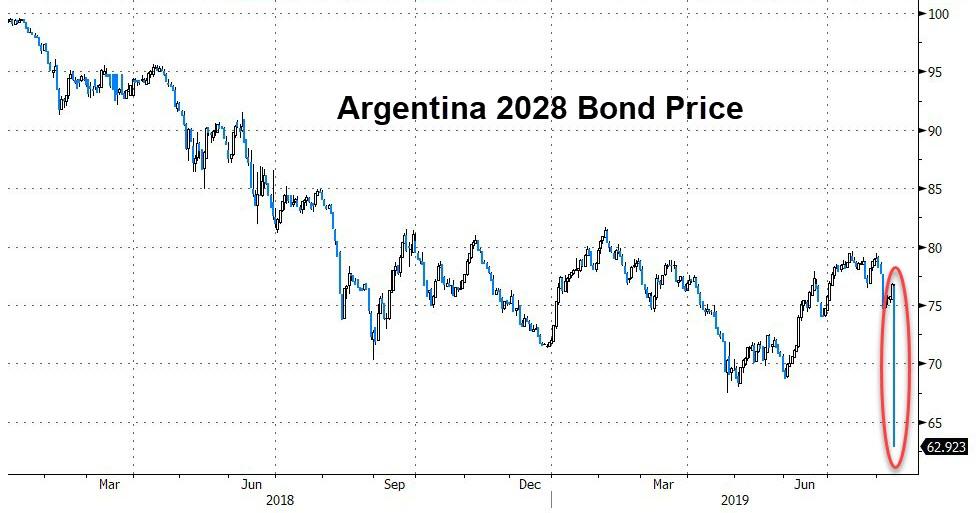
Source: Bloomberg
The Argentine century bond also collapsed.
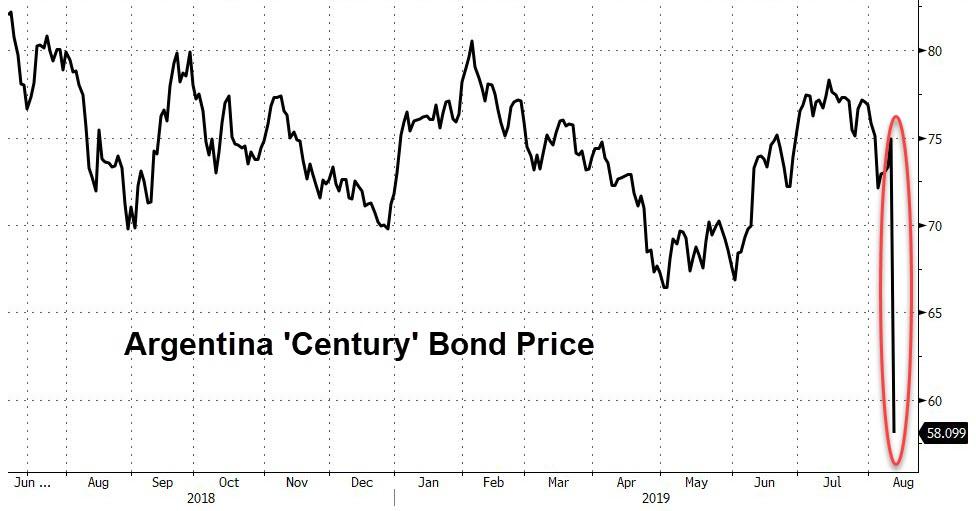
Source: Bloomberg
Meanwhile, the cost to insure Argentine debt swelled.
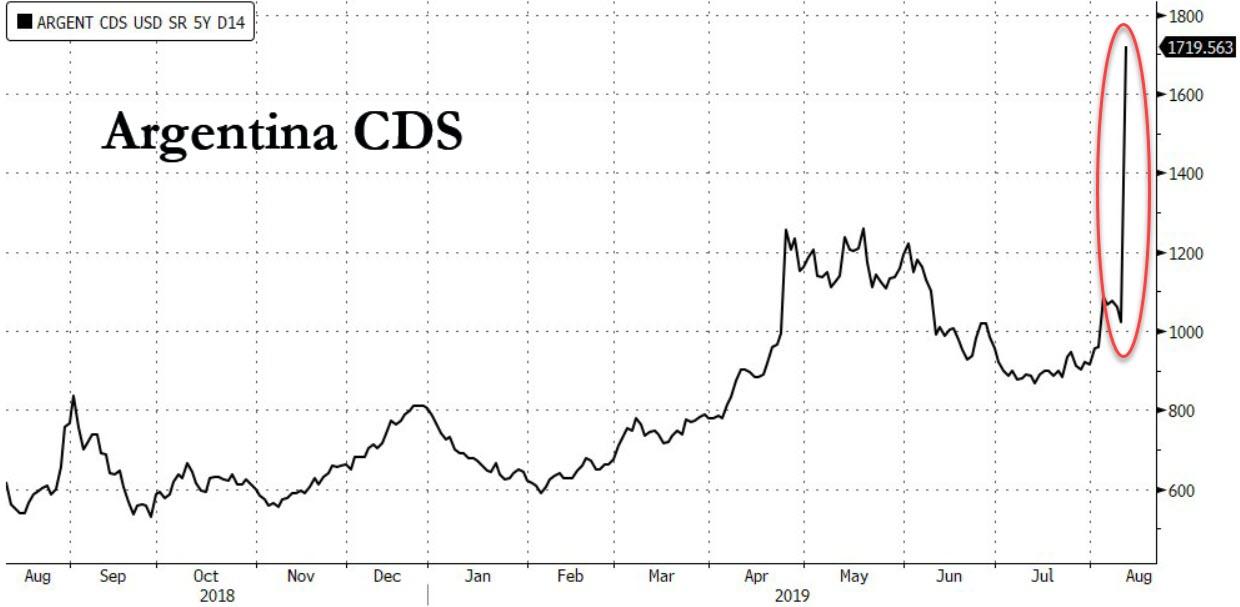
Source: Bloomberg
Fernández's primary win wasn't a surprise. In fact, markets had been anticipating a strong showing by Fernandez and vice presidential candidate Cristina Fernandez de Kirchner with a growing sense of dread.
However, the Argentine peso opened down a stunning 25%, crashing to a new record low at over 61/USD...
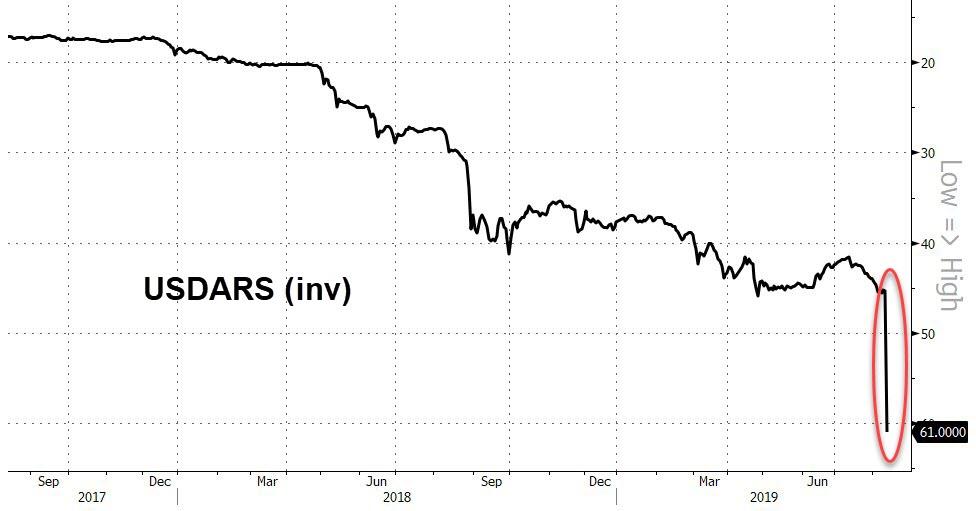
Source: Bloomberg
Many fear that if Macri loses this autumn's election, it could mean that the economic stability his government ushered in recently will come to an abrupt end. Under Macri, Argentina received the largest IMF bailout on record, $50 billion, largely to help stabilize the peso.
"The probable deterioration of sentiment and the resulting tightening of financial conditions in coming days and weeks may pose yet another headwind to the still fragile recovery of the Argentine economy," said Tiago Severo, economist at Goldman Sachs.
He added:
"More importantly from a political standpoint, renewed depreciation pressures on the peso may delay and perhaps even reverse the incipient decline in consumer price inflation, harming the image of the Macri administration and weighing further on the president's re-election bid."
On Sunday night, there were scenes of jubilation among Fernández's supporters around Buenos Aires, with chants of "We're going to return." Macri and his supporters were somewhat more restrained.
Commenti
Posta un commento